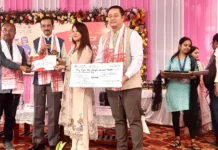ITANAGAR, 8 Apr: Six Ladakhi women from different organizations of the region, who concluded their 10-day fast as part of the ongoing struggle for statehood and 6th Schedule status for Ladakh, addressed an online press conference and feminist solidarity meet on 6 April.
The meeting, titled ‘Ladakhi women speak!’ was co-organised by Vikalp Sangam, PUCL and NAPM, in view of the government’s apathy and attempt to clamp down on the people’s movement after the announcement of a ‘Pashmina March’ to the border by climate activist Sonam Wangchuk, who recently concluded a 21-day fast as part of the struggle.
Kunzang Deachen from Local Futures, who laid the background of the demand for 6th Schedule status for Ladakh to secure cultural and ecological security of the region, dismissed the efforts to label the peaceful people’s movement as being ‘politically motivated’.
“Ours is simply a demand for a place-based policy for this Himalayan belt,” she said.
Anjuman-e-Moin-ul-Islam president Aisha Malo, who was on the 10-day fast said, “We were so pleased back in 2019 when the region was declared a union territory – a longstanding demand of the people of Ladakh. But in the last five years, we have learnt that, without legislative power, this is meaningless for us.”
Padma Ladol, a young artist and songwriter, sharply criticized the mainstream media for failing to give coverage to the Ladakhi movement and demands and instead being busy showing the Ambani pre-wedding functions.
Anjuman Imamia president Nasareen Maryam said, “Whenever there have been tensions at the border, we the women of Ladakh have supported the Army and the soldiers. We have sacrificed our children for the security of the country, but now, when we need the country, we are not being heard.”
Yangchan Dolker from the Apex Body Youth Wing emphasized that “women have not been on the forefront on social media but have been at the protest site since day one. Women have outnumbered men. It is women who have served the fasters and protestors.”
Christian Association Women’s Wing president Sumita Dhana, turning her camera, showed the mountains which are seeing lesser snow every year. “We need to safeguard our ecology not just for today but for our future generations, and for us development does not mean mining. We want better job prospects for the young, but in the current system, even programmes like Agniveer offer no economic, social security and stability,” said Dhana.
Feminists from across the country in one voice expressed solidarity with the women of Ladakh and their struggle for democracy and decentralisation of power, while decrying the extractive development model that is jeopardising lives and livelihoods in regions like Ladakh.
Speakers from Himalayan states – Manshi Asher (Himachal Pradesh), Malika Virdi (Uttarakhand), Jarjum Ete (Arunachal) and Abha Bhaiya (Himachal Pradesh) – pointed to the challenges facing the entire Himalayan region, which is slowly turning into a disaster zone, and the various people’s movements that have warned of the impacts of mindless development.
Adivasi leader Soni Sori spoke on the “repression and unbearable violence that the people, especially women, of Bastar and other Adivasi regions have seen over the last two decades, as they resist the takeover of their forest lands.”
Tashi, a Buddhist transgender human rights activist from Telangana, said, “Patriarchy is about control – be it over women or over resources, over all institutions and decision-making. It is unfortunate that when we look at the Himalaya, it’s always the outsiders’ view, and we never see the people.”
Madhuri of Jagrit Adivasi Dalit Sangathan, Madhya Pradesh, said, “This is a struggle against imperial forces. We had not fought for freedom from British rule only to see such a day again,” while Mumbai-based advocate Lara Jesani spoke of “the failure of law and judiciary in addressing human rights and environmental violations and the importance of direct democracy.”
Feminist and environmentalist Lalitha Ramdass stressed that “we need to vote wisely, so we can have people in government who we can demand accountability from.”
Meera Sanghamitra of NAPM and Shrishtee Bajpai of Vikalp Sangam reiterated that the people stand with “the Lakakhis’ resistance to greed-based development and demand for alternatives which are sustainable and just.”

